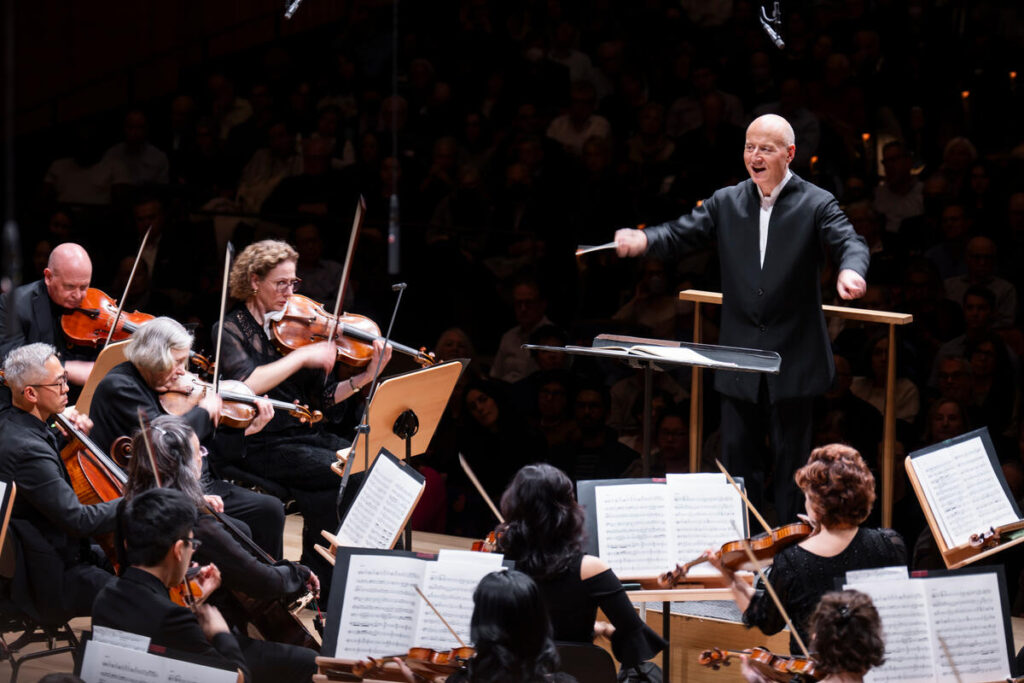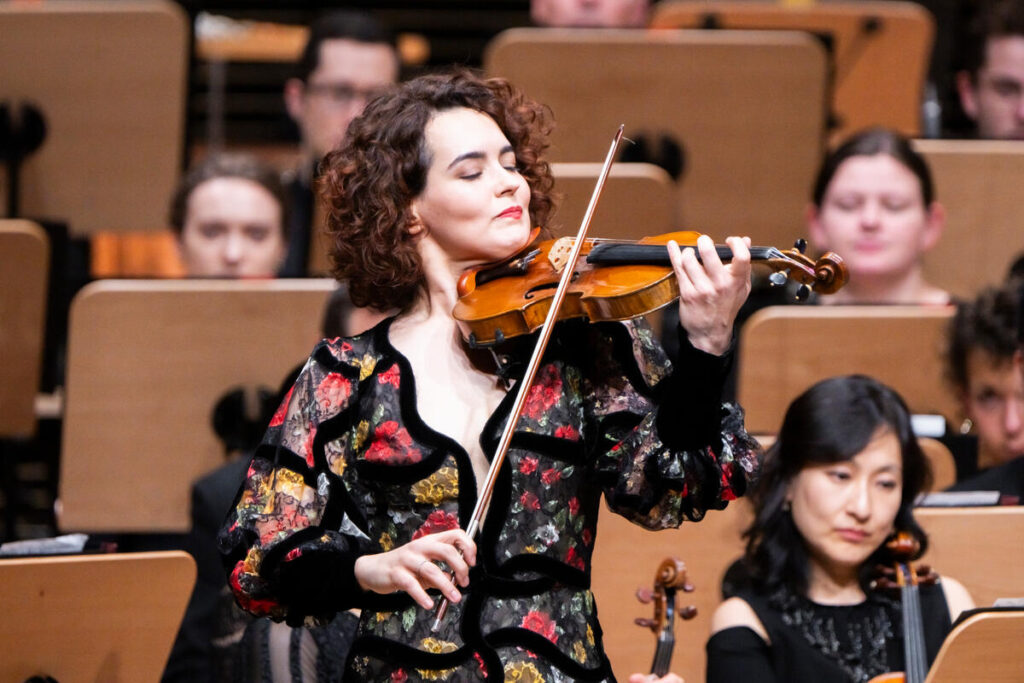Järvi, Baeva score in Wartime works with Philharmonic

Paavo Järvi conducted the New York Philharmonic in the first of three concerts of works forged in the crucible of war and its aftermath in mid-twentieth century Europe.
Thursday night’s program at David Geffen Hall featured Benjamin Britten’s Violin Concerto and Sergei Prokofiev’s Symphony No. 6, as well the Estonian composer Veljo Tormis’s Overture No. 2. Blazing brass and thundering percussion sliced through these works, but an intrinsic lyricism also courses through each of them. It was the latter quality that Järvi and the orchestra cultivated and expressed so eloquently in this concert.
Tormis was nine years old when Estonia was annexed by the Soviet Union in 1939. His early, somewhat stylistically conventional style, is exemplified by the Overture No. 2. Dating from 1959, the work reflects his growing fascination with his country’s tradition of choral singing and its ancient folk culture. In addition to being deeply spiritual, these works were also a covert way to express resistance to the Soviet regime.
The Overture is composed in the traditional ABA structure which Järvi launched with a fierce urgency and torrents of sound. Machine-gun like volleys from the snare drum were met by fierce outbursts from strings and woodwinds. Trumpet blasts and shrieking woodwinds created a sense of terror, which yielded to its contrasting middle section markedpiu tranquillo.
In this brief passage, the music took a drastic change in both texture and mood. It proved to be an opportunity for the NY Phil’s principal players to impress in solos and duets that lent a sense of intimacy and repose, however fleeting. Järvi let each of its melodies unfold unhurried and poised, until the somber sounds of the lower woodwinds presaged a return to the opening thematic material. Ferocious brass playing and ominous drum rolls led to the searing, final three ear-shattering chords.
As Great Britain prepared for war in early 1939, Britten sought exile in the United States. The twenty-five year old composers had two strikes against him, as he was a both a pacifist and a homosexual, either of which would have landed him in prison at the time. His Violin Concerto dates from that brief period of exile. When Britten submitted the work to his publisher, he described it as being “rather serious, I’m afraid—but it’s got some tunes in it!”
Järvi didn’t wait for the audience to settle before he gave the downbeat to the timpani to play the rhythmic figure which opens the concerto. Silence soon reigned as the same notes resounded ever louder three more times. They were the prelude to a mesmerizing performance by violinist Alena Baeva and spectacular playing from the orchestra.
Born in Kyrgyzstan, Baeva and her family fled during the 2010 Kyrgyz Revolution. Settling in Kazakhstan, she began studying the violin at the age of five with Olga Danilova. Her career has been centered in Europe and Asia, but she is making a number of important North American debuts this season, including her performances in these concerts.
Baeva has described Britten’s Violin Concerto as “the most challenging work written for violin soloist,” a “piece of extremes,” which is among “the most profound expression of existential questions of human life.” It is also a work of contrasts, with the violinist asked to play at the far reaches of its range, from the eerie false harmonics that end the first movement to trills played on the lowest string of the instrument in its final measures.
In between came transfixing playing from Baeva, rendered with searing intensity and purity of tone. The orchestra, however, has its moments as the young composer reveled in his already impressive command of orchestral textures and colors. The trio for two piccolos and tuba in the middle section is but one example of his puckish nature. Another is the concluding movement with its wonderful exchanges between soloist and orchestra, a dialogue which Järvi let unfold with maximum tonal and emotional impact.
Ill at ease in either Western Europe or the United States, Prokofiev returned to the Soviet Union in 1935. The first works which he composed in his native country were cast in a populist, at times heroic, style which found favor with the Soviet authorities. As Prokofiev’s style evolved to become darker, more complex, and increasingly challenging, that changed. He, along with Shostakovich and others, were called out in the infamous “Zhdanov Decree” of 1948. The recently completed Symphony No. 6, which debuted to critical acclaim, was singled out as an example of an affront to the ideals and principles of the Soviet Union.
Järvi led the NY Phil in a probing, carefully sculpted performance of the three-movement work. The woodwinds and brass, which had played so impressively in the Tormis and the Britten, provided similar visceral thrills here. It was, however, the NY Phil’s strings that impressed so in the Prokofiev and imparted this tragic work with singular beauty and poignancy.
In the first movement, Järvi balanced lyricism with rhythmic vitality, until the wail of trumpets resounded through the hall like air raid sirens. The second movement began with an almost overwhelming cataclysm of sound, which slowly evolved into cascading, transparent passages where arcs of melody, were played with a light transparency and a sentiment that verged on tenderness.
The third movement began with a swirl of energy, punctuated by the piano. Sprightliness reigned as conductor and orchestra spun through the third movement’s bouyant melodies. Unexpectedly, there was wit and humor in abundance with Järvi often smiling at the orchestra while they played. There were some terrifying moments to come, before Järvi ended the performance with a final burst of triumph.
The program will be repeated 8 p.m. Friday and 3 p.m. Sunday. nyphil.org

Comments